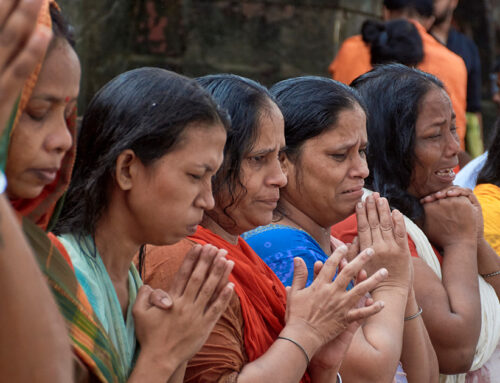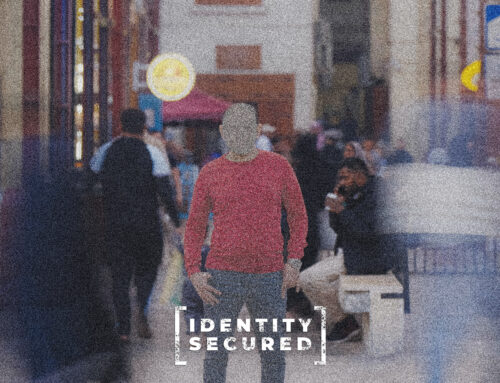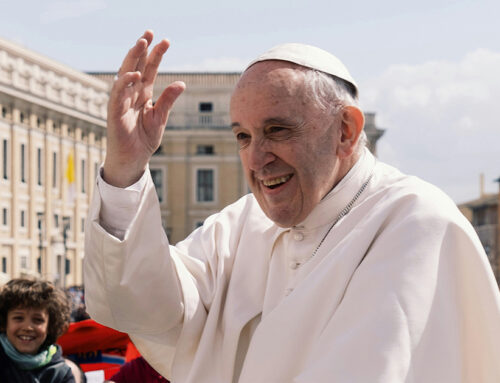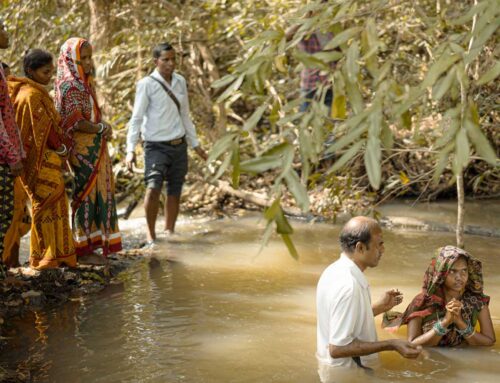A New Day In Belarus

When the “Iron Curtain” of the Soviet Union fell across eastern Europe in the early 1990s, an era of rapid change and widespread optimism began. Citizens began to travel freely, new governments were formed, and there was finally some semblance of religious freedom. Nations broke away and sought to rebuild cultural identities lost for more than half a century.
Nestled between Russia and Ukraine, Belarus established sovereignty from the Soviet Union in July of 1990. But like other countries formerly part of the USSR, the nation would find that decades of communist oppression had left a lasting mark on their society, its effects still felt today.
Haggai leader Denis Yekinov is a business consultant in Belarus, and for most of his life Belarus has been a sovereign nation. A committed believer dedicated to advancing the Gospel, Denis shares that his nation is still a hostile environment for many followers of Jesus.
“Belarus is similar to the USSR. There is powerful ideology and propaganda. Television is mainly state-owned. Dissent in government bodies and public organizations is discouraged. This creates an unfavorable atmosphere for the Gospel and leads to persecution of Christians, a ban on the registration of churches and public organizations, and a ban on inviting foreign preachers, punishing people for commenting in the media and infringing on the rights of citizens.”
In 2014, Denis attended the Haggai Leader Experience. It was there that he truly began to understand that as a Christian in the marketplace, he held an awesome responsibility to lead by example and to advocate for others. It also changed his outlook on the future of his own country.
If the country is dominated by sin, which means evil, then it will not stand. Therefore, sharing the Gospel is very important, both for ordinary people and for the leaders of the nation, because a lot depends on them. And the Word of God can transform the thinking and spirit of a person and influence his or her actions.
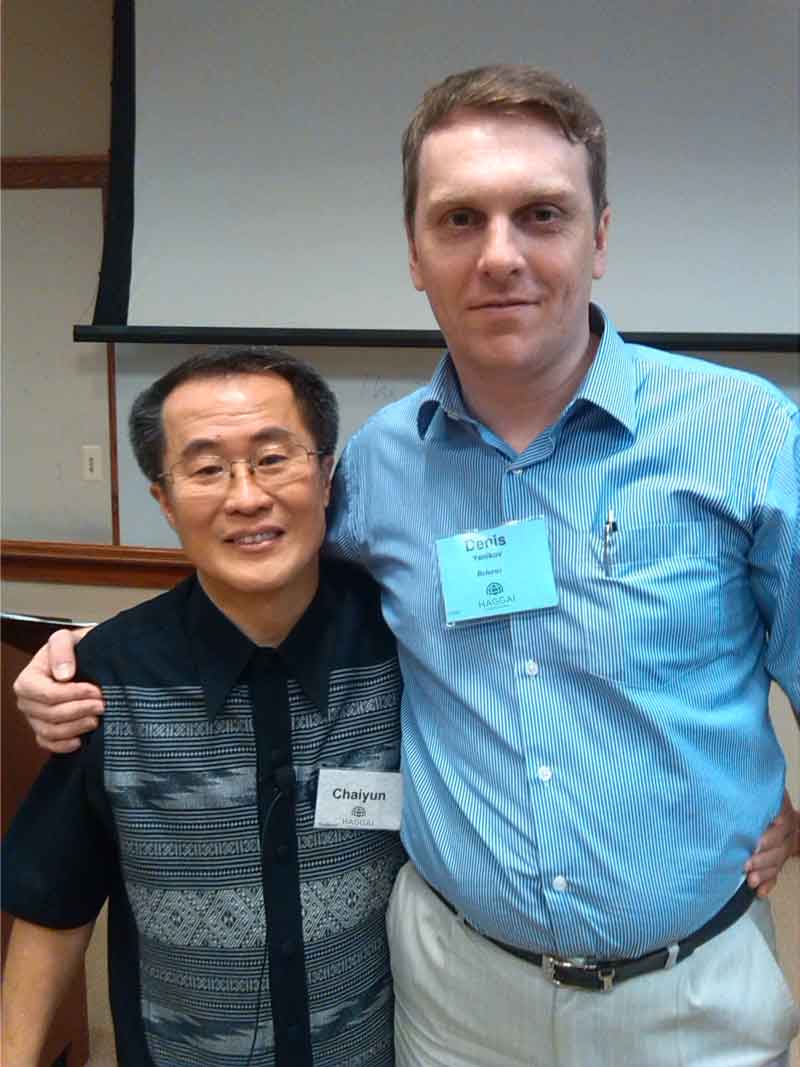
Denis attended the Haggai Leader Experience in 2014.
This summer, Belarus endured one of the most fraught elections in its three decades of independence. Alexander Lukashenko, President since 1994, had served five terms through elections that many international critics deemed “neither free nor fair.” On August 9, 2020, Lukashenko won a sixth term, despite claims that his opponent had won at least 60 percent of the vote.
Fed up with the corrupt system, thousands took to the streets in protest. Though mostly peaceful, more than 8,000 citizens were arrested, with widespread reports of violence at the hands of authorities and several casualties.
Denis knew that he had to speak up, leverage his network of powerful contacts, and advocate for justice in his own nation. Together, they wrote letters to the country’s election commissions and local representatives, describing the urgency of the situation and preaching the Gospel. They arranged meetings with senior military officials, as well as delegates from the Ministry of the Interior, the Ministry of Internal Affairs, the Supreme Court, and Parliament. Knowing the Church would also be a powerful voice for justice, Denis recruited bishops from the nation’s Orthodox and Catholic churches to speak out as well.
“[Our] main message was that the events that are taking place, on the one hand, are a gross violation of international law, the Constitution of Belarus, and the electoral and criminal codes… Christ shed blood for every person in order to cleanse from sins. The authorities of Belarus, on the contrary, are shedding the blood of these people, and God will [judge them for] violating the biblical commandments.”
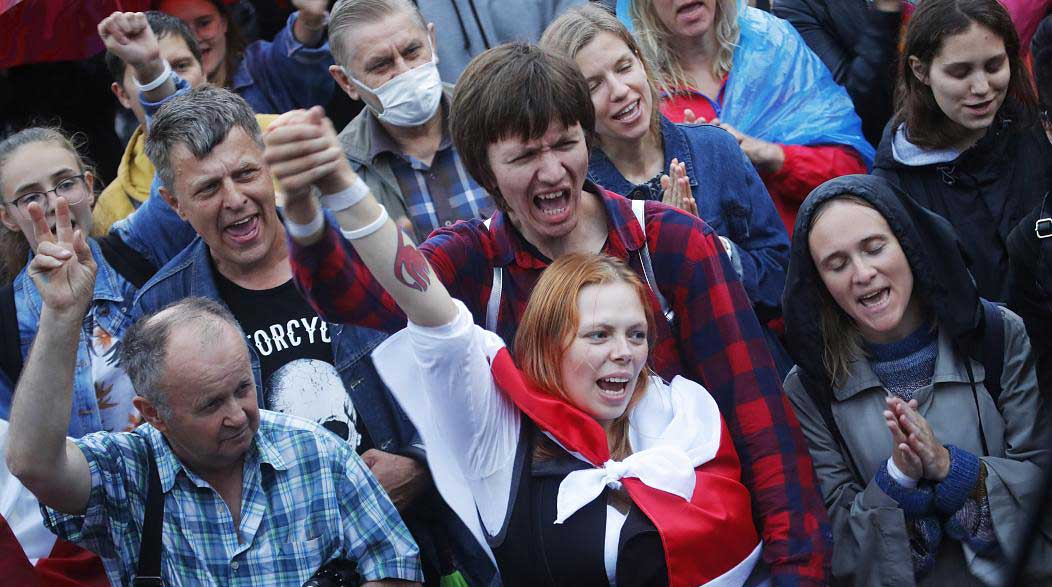
Thousands took to the streets in protest of the corrupt election system.
Miraculously, the appeals for peace and non-violence on the part of Denis, his cohorts, and others like them have been effective. The protests have grown exponentially with no sign of diminishing, but the government’s violent response has subsided. Those in favor of peaceful democracy appear to be gaining ground, and the EU is said to be preparing sanctions against the Belarusian officials involved in electoral fraud and brutality during the protests.
Though this story is far from over, Denis is hopeful for the future of Belarus:
“In a situation of political and economic crisis, the task of every person in the country is to do [whatever they can]. These efforts by many, if not all, are driving change at the country level. Christians should not be outside of politics, because if you are not involved in politics, politics [will overtake you].”
A New Day In Belarus

When the “Iron Curtain” of the Soviet Union fell across eastern Europe in the early 1990s, an era of rapid change and widespread optimism began. Citizens began to travel freely, new governments were formed, and there was finally some semblance of religious freedom. Nations broke away and sought to rebuild cultural identities lost for more than half a century.
Nestled between Russia and Ukraine, Belarus established sovereignty from the Soviet Union in July of 1990. But like other countries formerly part of the USSR, the nation would find that decades of communist oppression had left a lasting mark on their society, its effects still felt today.
Haggai leader Denis Yekinov is a business consultant in Belarus, and for most of his life Belarus has been a sovereign nation. A committed believer dedicated to advancing the Gospel, Denis shares that his nation is still a hostile environment for many followers of Jesus.
“Belarus is similar to the USSR. There is powerful ideology and propaganda. Television is mainly state-owned. Dissent in government bodies and public organizations is discouraged. This creates an unfavorable atmosphere for the Gospel and leads to persecution of Christians, a ban on the registration of churches and public organizations, and a ban on inviting foreign preachers, punishing people for commenting in the media and infringing on the rights of citizens.”
In 2014, Denis attended the Haggai Leader Experience. It was there that he truly began to understand that as a Christian in the marketplace, he held an awesome responsibility to lead by example and to advocate for others. It also changed his outlook on the future of his own country.
If the country is dominated by sin, which means evil, then it will not stand. Therefore, sharing the Gospel is very important, both for ordinary people and for the leaders of the nation, because a lot depends on them. And the Word of God can transform the thinking and spirit of a person and influence his or her actions.

Denis attended the Haggai Leader Experience in 2014.
This summer, Belarus endured one of the most fraught elections in its three decades of independence. Alexander Lukashenko, President since 1994, had served five terms through elections that many international critics deemed “neither free nor fair.” On August 9, 2020, Lukashenko won a sixth term, despite claims that his opponent had won at least 60 percent of the vote.
Fed up with the corrupt system, thousands took to the streets in protest. Though mostly peaceful, more than 8,000 citizens were arrested, with widespread reports of violence at the hands of authorities and several casualties.
Denis knew that he had to speak up, leverage his network of powerful contacts, and advocate for justice in his own nation. Together, they wrote letters to the country’s election commissions and local representatives, describing the urgency of the situation and preaching the Gospel. They arranged meetings with senior military officials, as well as delegates from the Ministry of the Interior, the Ministry of Internal Affairs, the Supreme Court, and Parliament. Knowing the Church would also be a powerful voice for justice, Denis recruited bishops from the nation’s Orthodox and Catholic churches to speak out as well.
“[Our] main message was that the events that are taking place, on the one hand, are a gross violation of international law, the Constitution of Belarus, and the electoral and criminal codes… Christ shed blood for every person in order to cleanse from sins. The authorities of Belarus, on the contrary, are shedding the blood of these people, and God will [judge them for] violating the biblical commandments.”

Thousands took to the streets in protest of the corrupt election system.
Miraculously, the appeals for peace and non-violence on the part of Denis, his cohorts, and others like them have been effective. The protests have grown exponentially with no sign of diminishing, but the government’s violent response has subsided. Those in favor of peaceful democracy appear to be gaining ground, and the EU is said to be preparing sanctions against the Belarusian officials involved in electoral fraud and brutality during the protests.
Though this story is far from over, Denis is hopeful for the future of Belarus:
“In a situation of political and economic crisis, the task of every person in the country is to do [whatever they can]. These efforts by many, if not all, are driving change at the country level. Christians should not be outside of politics, because if you are not involved in politics, politics [will overtake you].”
A New Day In Belarus

When the “Iron Curtain” of the Soviet Union fell across eastern Europe in the early 1990s, an era of rapid change and widespread optimism began. Citizens began to travel freely, new governments were formed, and there was finally some semblance of religious freedom. Nations broke away and sought to rebuild cultural identities lost for more than half a century.
Nestled between Russia and Ukraine, Belarus established sovereignty from the Soviet Union in July of 1990. But like other countries formerly part of the USSR, the nation would find that decades of communist oppression had left a lasting mark on their society, its effects still felt today.
Haggai leader Denis Yekinov is a business consultant in Belarus, and for most of his life Belarus has been a sovereign nation. A committed believer dedicated to advancing the Gospel, Denis shares that his nation is still a hostile environment for many followers of Jesus.
“Belarus is similar to the USSR. There is powerful ideology and propaganda. Television is mainly state-owned. Dissent in government bodies and public organizations is discouraged. This creates an unfavorable atmosphere for the Gospel and leads to persecution of Christians, a ban on the registration of churches and public organizations, and a ban on inviting foreign preachers, punishing people for commenting in the media and infringing on the rights of citizens.”
In 2014, Denis attended the Haggai Leader Experience. It was there that he truly began to understand that as a Christian in the marketplace, he held an awesome responsibility to lead by example and to advocate for others. It also changed his outlook on the future of his own country.
If the country is dominated by sin, which means evil, then it will not stand. Therefore, sharing the Gospel is very important, both for ordinary people and for the leaders of the nation, because a lot depends on them. And the Word of God can transform the thinking and spirit of a person and influence his or her actions.

Denis attended the Haggai Leader Experience in 2014.
This summer, Belarus endured one of the most fraught elections in its three decades of independence. Alexander Lukashenko, President since 1994, had served five terms through elections that many international critics deemed “neither free nor fair.” On August 9, 2020, Lukashenko won a sixth term, despite claims that his opponent had won at least 60 percent of the vote.
Fed up with the corrupt system, thousands took to the streets in protest. Though mostly peaceful, more than 8,000 citizens were arrested, with widespread reports of violence at the hands of authorities and several casualties.
Denis knew that he had to speak up, leverage his network of powerful contacts, and advocate for justice in his own nation. Together, they wrote letters to the country’s election commissions and local representatives, describing the urgency of the situation and preaching the Gospel. They arranged meetings with senior military officials, as well as delegates from the Ministry of the Interior, the Ministry of Internal Affairs, the Supreme Court, and Parliament. Knowing the Church would also be a powerful voice for justice, Denis recruited bishops from the nation’s Orthodox and Catholic churches to speak out as well.
“[Our] main message was that the events that are taking place, on the one hand, are a gross violation of international law, the Constitution of Belarus, and the electoral and criminal codes… Christ shed blood for every person in order to cleanse from sins. The authorities of Belarus, on the contrary, are shedding the blood of these people, and God will [judge them for] violating the biblical commandments.”

Thousands took to the streets in protest of the corrupt election system.
Miraculously, the appeals for peace and non-violence on the part of Denis, his cohorts, and others like them have been effective. The protests have grown exponentially with no sign of diminishing, but the government’s violent response has subsided. Those in favor of peaceful democracy appear to be gaining ground, and the EU is said to be preparing sanctions against the Belarusian officials involved in electoral fraud and brutality during the protests.
Though this story is far from over, Denis is hopeful for the future of Belarus:
“In a situation of political and economic crisis, the task of every person in the country is to do [whatever they can]. These efforts by many, if not all, are driving change at the country level. Christians should not be outside of politics, because if you are not involved in politics, politics [will overtake you].”


